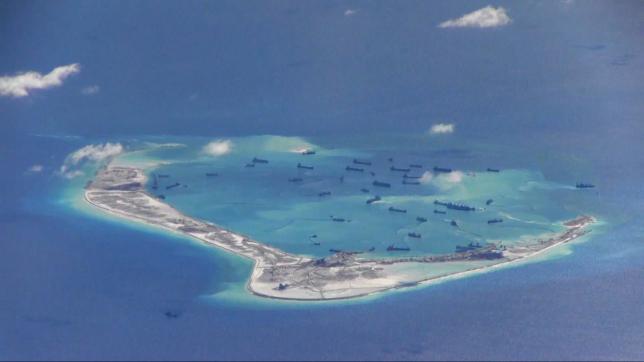India Seeks $1.1 Billion Reparation After MSC Fuel Spill in May
The southern Indian state of Kerala has sued MSC Mediterranean Shipping Co. for the environmental damages caused by a ship capsizing off its coast, according to a court document.

REUTERS/U.S. NAVY/HANDOUT VIA REUTERS
![]() BY DAVID ALEXANDER AND RACHEL ARMSTRONG (Reuters) U.S. Defense Secretary Ash Carter said on Saturday that China’s island-building in the South China Sea was undermining security in the Asia-Pacific, drawing a scathing response from the foreign ministry in Beijing.
BY DAVID ALEXANDER AND RACHEL ARMSTRONG (Reuters) U.S. Defense Secretary Ash Carter said on Saturday that China’s island-building in the South China Sea was undermining security in the Asia-Pacific, drawing a scathing response from the foreign ministry in Beijing.
Carter, speaking to top defense officials from the Asia-Pacific at the annual Shangri-La Dialogue in Singapore, acknowledged that several countries had created outposts in the region’s disputed islands, but he said the scope of China’s activity created uncertainty about its future plans.
[contextly_sidebar id=”VVJ7XUaqQ8M76jHmJzfPhqYjgO8TNmMH”]”China has reclaimed over 2,000 acres, more than all other claimants combined … and China did so in only the last 18 months,” Carter told the Shangri-La Dialogue security forum. “It is unclear how much farther China will go.”
He said the United States was “deeply concerned” about the scale of China’s land reclamation and the prospect of further militarization of the islands, saying it would boost “the risk of miscalculation or conflict.”
A Chinese delegate at the forum initially gave a measured response, in which he said Carter’s comments were not as hostile as those made at the Shangri-La Dialogue in previous years, but the foreign ministry reacted strongly.
“The United States disregards history, legal principles and the facts,” spokeswoman Hua Chunying said. “China’s sovereignty and relevant rights were established a long time ago in the South China Sea.
China’s island-building is “legal, reasonable, conforms to the situation and neither impacts nor targets any country.”
Despite the rhetoric, Carter said there was no military solution to the South China Sea disputes. “Right now is the time for renewed diplomacy, focused on a finding a lasting solution that protects the rights and interests of all,” he said.
COMPETING CLAIMS
China, Malaysia, Taiwan, Brunei, Vietnam and the Philippines have overlapping claims in the resource-rich South China Sea. Japan and China both claim islands that lie between them in the East China Sea.
But earlier this week, Beijing was assertive about the disputes. In a policy document issued by the State Council, the country’s cabinet, China vowed to increase its “open seas protection”, switching from air defense to both offence and defense, and criticized neighbors who took “provocative actions” on its reefs and islands.
Carter’s remarks in Singapore came a day after the Pentagon confirmed reports that China had put mobile artillery at one of its reclaimed islands in the South China Sea.
The U.S. defense chief insisted U.S. forces would continue to “fly, sail and operate” in the region to ensure the freedom of navigation and overflight permitted by law.
Japan’s defense minister said China and other parties in the dispute had to behave responsibly.
“If we leave any unlawful situation unattended, order will soon turn to disorder, and peace and stability will collapse,” Gen Nakatani told the forum. “I hope and expect all the countries, including China, to behave as a responsible power,” he said.
Malaysia’s defense minister, Hishammuddin Hussein, urged all parties in the South China Sea dispute to exercise restraint or face potentially dangerous consequences.
“This has the potential to escalate into one of the deadliest conflicts of our time, if not history,” he said. “Inflamed rhetoric does not do any nation any good”.
(Additional reporting by Rujun Shen, Masayuki Kitano, Siva Govindasamy and Sue-Lin Wong in Shanghai; Editing by Raju Gopalakrishnan)
© 2015 Thomson Reuters. All rights reserved.

Sign up for gCaptain’s newsletter and never miss an update

Subscribe to gCaptain Daily and stay informed with the latest global maritime and offshore news


Stay informed with the latest maritime and offshore news, delivered daily straight to your inbox
Essential news coupled with the finest maritime content sourced from across the globe.
Sign Up